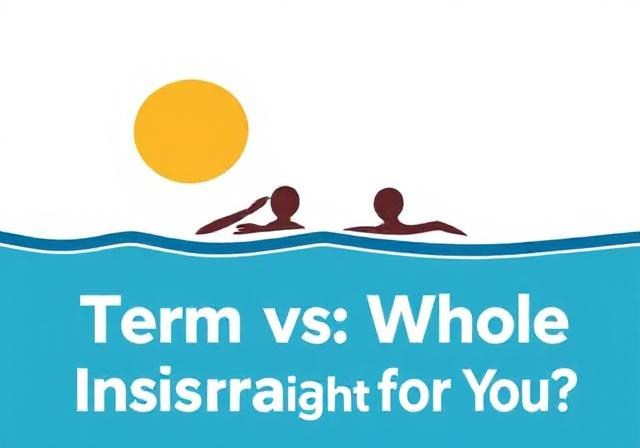Introduction:
Life insurance serves as an essential financial instrument, ensuring security and tranquility for your loved ones by safeguarding their future in your absence. But which 1 is right for you “Term vs. Whole Life Insurance” ? Yet, the process of selecting the most suitable life insurance policy can often feel daunting due to the variety of options available.
The two main categories—term life insurance and whole life insurance—each come with distinct advantages tailored to different financial objectives and personal situations. Term life insurance typically offers coverage for a specific period, making it a cost-effective choice for those seeking temporary protection, such as during the years of raising a family or paying off a mortgage. On the other hand, whole life insurance provides lifelong coverage with the added benefit of a cash value component that grows over time, offering a potential source of savings or investment.
This article aims to simplify your decision-making process by going into the specifics of both term and whole life insurance. We will examine their respective benefits and drawbacks, providing a clear comparison to help you understand how each option aligns with your unique needs. By the end, you’ll have the insights necessary to confidently choose the life insurance policy that best fits your financial goals and ensures your family’s long-term well-being.
Table of Contents:
What is Term Life Insurance?
Term life insurance provides coverage for a specific period, usually ranging from 10 to 30 years. If the policyholder passes away during the term, the beneficiaries receive a death benefit, which can be used to cover expenses such as mortgage payments, education costs, or daily living expenses.
However, if the term expires and the policy is not renewed, coverage ends without any payout. This makes term life insurance an attractive option for individuals seeking affordable protection during key financial periods, such as raising a family or paying off debts.
Additionally, many policies offer the option to convert to permanent coverage before the term ends, allowing flexibility for future financial planning.
Pros of Term Life Insurance:
✔ Affordable Premiums: Term life insurance is generally much cheaper than whole life insurance, making it ideal for young families and budget-conscious individuals.
✔ Simple and Straightforward: You pay premiums for a fixed term, and your beneficiaries receive a payout if you pass away within that period.
✔ Flexible Coverage Durations: You can choose a term that aligns with major financial obligations, such as a mortgage or your child’s education.
✔ Higher Coverage Amounts: Since premiums are lower, you can afford more coverage compared to whole life insurance.
Cons of Term Life Insurance:
✖ No Cash Value: Term policies do not accumulate cash value, meaning you don’t get any return on your investment.
✖ Coverage Ends: If you outlive the term, you must renew at higher premiums or lose coverage entirely.
✖ No Investment Component: Unlike whole life insurance, term insurance doesn’t build wealth over time.

What is Whole Life Insurance?
Whole life insurance is a permanent policy that provides coverage for your entire lifetime, as long as premiums are paid. It also includes a cash value component, which grows over time and can be borrowed against or withdrawn. Credit Score plays an important role in determining your policy terms and conditions. One should be well aware of it.
This cash value accumulates on a tax-deferred basis, allowing policyholders to access it for various financial needs, such as funding a child’s education, covering medical expenses, or supplementing retirement income.
Additionally, whole life insurance policies often come with guaranteed death benefits, ensuring financial security for your beneficiaries regardless of when you pass away. Health insurance is also an important part of Life insurance. You may also like to go through here for comprehensive review for best health Insurance knowledge.
Some policies even offer dividends, which can be used to reduce premiums or increase the policy’s cash value. However, the higher premiums and complex structure make it essential for policyholders to carefully evaluate their financial goals and consult with a financial advisor before committing to this type of insurance.
Pros of Whole Life Insurance:
✔ Lifelong Coverage: Your policy remains active as long as you continue paying premiums.
✔ Cash Value Growth: A portion of your premiums accumulates as cash value, which can be accessed for loans, emergencies, or retirement.
✔ Guaranteed Death Benefit: Your beneficiaries will receive a payout regardless of when you pass away.
✔ Potential Dividends: Some policies pay dividends, providing extra financial benefits.
Cons of Whole Life Insurance:
✖ Higher Premiums: Whole life insurance can cost 5 to 15 times more than term insurance for the same coverage amount.
✖ Complex Structure: With built-in investment components, understanding how the policy works can be challenging.
✖ Lower Investment Returns: Compared to traditional investments like stocks or mutual funds, the cash value growth is relatively slow.

Term vs. Whole Life Insurance: A Side-by-Side Comparison
| Feature | Term Life Insurance | Whole-Life Insurance |
|---|---|---|
| Coverage Duration | Fixed (10-30 years) | Lifetime |
| Premiums | Lower | Higher |
| Cash Value | No | Yes |
| Payout | Only if the policyholder dies during the term | Guaranteed payout |
| Investment Component | No | Yes (Cash Value) |
| Flexibility | Can expire without renewal | Permanent coverage |

Which One Should You Choose?
Term Life Insurance is Best For:
✔ Young families who need affordable coverage
✔ Homeowners with mortgages
✔ Parents who want to secure their children’s education
✔ Individuals with temporary financial obligations
Whole Life Insurance is Best For:
✔ Individuals looking for lifetime coverage
✔ Those who want to build cash value
✔ High-income earners who need tax-advantaged savings
✔ People who want to leave a guaranteed inheritance
Final Thoughts:
Choosing between term and whole life insurance depends on your financial goals, budget, and long-term needs. If you need affordable, temporary coverage, term life insurance is the best choice. If you’re looking for lifelong protection with investment benefits, whole life insurance is worth considering.
Before making a decision, assess your financial situation and consult with a licensed insurance professional to find the best policy for your needs. Life insurance is a long-term commitment, so making the right choice today ensures financial security for your loved ones in the future. One should have thorough knowledge about choosing the best insurance company for optimal premium and quality after sell policy service.
Additionally, checking if your policy includes Uninsured Motorist Coverage can help protect against medical expenses and vehicle repairs in case of an accident with an uninsured driver. The policy should also cover Car and auto insurance benefits, If you lack this coverage, collision coverage might assist with repairs, although you may face out-of-pocket expenses depending on your deductible and policy limits.
Consider adding Underinsured Motorist Coverage to safeguard against drivers with insufficient insurance. Regularly reviewing your policy with your provider ensures you have adequate protection for such scenarios.
Disclaimer:
The content provided in the article “Term vs. Whole Life Insurance: Which 1 is Absolutely Right for You?” is intended for informational and educational purposes only. It aims to offer general insights into the differences between term and whole life insurance to help you make an informed decision. However, this article does not constitute professional financial, legal, or insurance advice. Individual financial situations, goals, and needs vary, and the suitability of a life insurance policy depends on factors unique to each person.
We strongly recommend consulting with a licensed insurance advisor or financial professional who can assess your specific circumstances, provide personalized recommendations, and ensure that your chosen policy aligns with your long-term financial objectives. The authors and publishers of this article are not responsible for any decisions made based on the information provided, nor for any financial outcomes that may result. Always conduct thorough research and seek expert guidance before purchasing any insurance product to ensure it meets your family’s needs and offers the protection you seek.
Have Questions?
Let us know in the comments below! We’d love to help you make an informed decision about your life insurance options. Whether you’re exploring Term Life or Whole Life Insurance, or need advice on additional coverage like Uninsured Motorist Coverage for accidents with uninsured drivers, we’re here to assist you. Always visit with us and learn more
